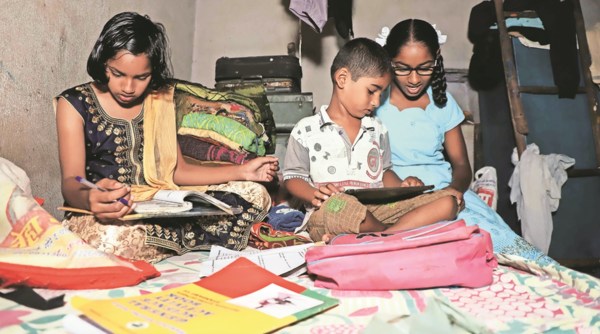[ad_1]
As the clock strikes 7 in the evening, school headmaster Janardhan Dhane climbs two flights of stairs to the roof where a siren has been installed by the Zilla Parishad school management committee. It’s time to sound the alarm.
As the siren reverberates through Kheradewangi village, mothers call out to their children playing outdoors. They rush home where TV sets are turned off and mobile phones put on silent mode. Children pull out their books to sit down and read, do homework, their parents keep a watchful eye. Even grandparents join in to read.
It’s “digital blackout” time.
 Children in the village study after sundown. (Express Photo by Pavan Khengre)
Children in the village study after sundown. (Express Photo by Pavan Khengre)
For over six months, at least half a dozen villages in Maharashtra’s Sangli district have been following this at sundown — and no one’s complaining.
Indeed, the idea was counter-intuitive. During the pandemic, when the screen became a ubiquitous tool for learning, here it set off a different thought.
“It is due to the pandemic that villagers and teachers together thought of this initiative. Schools were closed and kids got completely distanced from books,” said Jitendra Dudi, CEO, Sangli district. “They needed to get back into the habit of reading. That’s when one village decided to take up this initiative. As videos started going viral, it generated a lot of buzz and other villages followed suit. Now several villages in this block are observing this kind of digital blackout.”
Anis Naikawdi, block education officer of Kadegaon Taluka, told The Indian Express that five villages have adopted the “siren” project: Kheradewangi, Hinganrao Budruk, Mohityachi Wadgaon, Devrashtra and Hinganrao Khurd.
Weaning children off the screen is a challenge anywhere and even here, it has been easier said than done.
Pratibha Gurav, the 35-year-old sarpanch of Kheradewangi village and mother of two, said it took several weeks before the idea gained acceptance.
“Although the villagers liked the idea, to get them to follow it consistently was a challenge. Initially, we went door to door, explaining the project and asking mothers to take the lead. After a few initial days of enthusiasm, elders in the family caved in and started watching TV again, some other family members would also join them on the pretext of feeling bored. Finally, after a lot of counselling, some heated arguments and a resolution passed by the panchayat, we have started observing “no screen policy” from 7 pm to 8 pm every day,” said Gurav.
Said Sujata Hajare (33), a teacher and mother to Tirth (9) and Rugveda (4): “Now it has become a force of habit. Kids come back home from school, eat and rest or help with some housework and then go out to play. When the alarm goes off, they come back home on their own and take their books out. We don’t even need to remind them anymore because every child in the village is doing the same thing. What else will they do? No one watches TV, no one plays outside. It was tough initially, but all of us (mothers) got together and decided to be strict about this, and now it is such a relief. We have stopped bothering about homework and studies, the kids do it on their own,” she said.
13-year-old Sneha Suryavanshi, the eldest of three siblings, said the digital lockout has made her task of getting her younger sisters to do their homework easier.
“Earlier whenever we would sit down to study, their friends would come and call them or someone would switch on the TV and they would run away from books. Sometimes, I do my homework too or I sit and paint while they study,” said the Class 8 student of Kheradewangi village.
Jayshree Vithhal Kharade, a mother of two from nearby Hinganrao Budruk village in Kadegaon taluka, another village observing the digital blackout, said the change is not just in the students.
“Even the elders get together and read religious books. Sometimes they go for a walk. Earlier, we could only hear TV in their houses. Now the entire village is so silent at this hour. It has made a lot of difference in overall positivity. Besides, we see the impact on children’s performance in school. They are now so regular with their studies and have a dedicated daily hour. We don’t skip this routine even on Sundays,” she said.
Sudheer Pore, teacher at the Zilla Parishad school in Kheradewangi, one of the few ‘model’ schools in the district, said it has made a difference in learning outcomes.
Zilla Parishad schools in Sangli have been running a “learning improvement programme” spearheaded by the district administration. Under this, learning levels were assessed and strategies devised to improve these. “In six months, there has been considerable improvement in that but at the same time, when the village runs an experiment such as the digital blackout, it bolsters our work. Kids are reading on their own, without a single day’s break and dedicatedly for an hour. Consistency makes a lot of difference and the results are showing now,” he said.
!function(f,b,e,v,n,t,s)
{if(f.fbq)return;n=f.fbq=function(){n.callMethod?
n.callMethod.apply(n,arguments):n.queue.push(arguments)};
if(!f._fbq)f._fbq=n;n.push=n;n.loaded=!0;n.version=’2.0′;
n.queue=[];t=b.createElement(e);t.async=!0;
t.src=v;s=b.getElementsByTagName(e)[0];
s.parentNode.insertBefore(t,s)}(window, document,’script’,
‘https://connect.facebook.net/en_US/fbevents.js’);
fbq(‘init’, ‘444470064056909’);
fbq(‘track’, ‘PageView’);
[ad_2]
Source link



